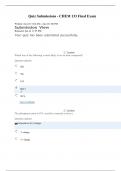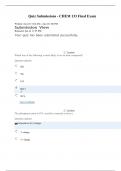Expanded octet - Study guides, Class notes & Summaries
Looking for the best study guides, study notes and summaries about Expanded octet? On this page you'll find 34 study documents about Expanded octet.
All 34 results
Sort by
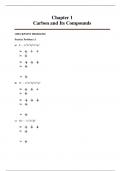 Popular
Popular
-
Solution Manual for Organic Chemistry Mechanistic Patterns Canadian 1st Edition Ogilvie Ackroyd Br
- Exam (elaborations) • 809 pages • 2024
-
- $48.48
- 1x sold
- + learn more
Chapter 1 Carbon and Its Compounds CHECKPOINT PROBLEMS Practice Problem 1.1 a) S — 1s2 2s2 2p6 3s2 3p4 b) Cl — 1s2 2s2 2p6 3s2 3p5 c) Na+ — 1s2 2s2 2p6 1-2 Copyright © 2018 Nelson Education Limited Practice Problem 1.2 a) Count valence electrons. Build a basic bonding framework and account for electrons used. Add remaining electrons and check for formal charges. The molecule has a lone pair on the nitrogen. All other electrons are bonding electrons. b) Count valence...
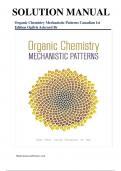 Popular
Popular
-
Solution Manual for Organic Chemistry Mechanistic Patterns Canadian 1st Edition by Ogilvie Ackroyd Br
- Exam (elaborations) • 811 pages • 2024 Popular
-
- $19.99
- 1x sold
- + learn more
Chapter 1 Carbon and Its Compounds CHECKPOINT PROBLEMS Practice Problem 1.1 a) S — 1s2 2s2 2p6 3s2 3p4 b) Cl — 1s2 2s2 2p6 3s2 3p5 c) Na+ — 1s2 2s2 2p6 1-2 Copyright © 2018 Nelson Education Limited Practice Problem 1.2 a) Count valence electrons. Build a basic bonding framework and account for electrons used. Add remaining electrons and check for formal charges. The molecule has a lone pair on the nitrogen. All other electrons are bonding electrons. b) Count valence electrons. Build a bas...
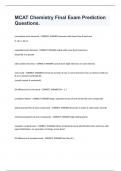
-
MCAT Chemistry Final Exam Prediction Questions.
- Exam (elaborations) • 18 pages • 2024
-
- $12.99
- + learn more
MCAT Chemistry Final Exam Prediction Questions. incomplete octet elements - CORRECT ANSWER elements with fewer than 8 electrons H, He, Li, Be, B expanded octet elements - CORRECT ANSWER stable with more than 8 electrons all period 3 or greater odd number electrons - CORRECT ANSWER cannot have eight electrons on each element ionic bond - CORRECT ANSWER formed via transfer of one or more electrons from an element with low IE to an element with high EA (usually metals & nonmetals...
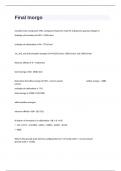
-
Final Inorgo Exam Questions And Complete Correct Answers Graded A+.
- Exam (elaborations) • 20 pages • 2024
-
Available in package deal
-
- $15.49
- + learn more
Consider ionic compound, MX3, composed of generic metal M and generic gaseous halogen X. Enthalpy of formation of MX3 =-701kJ/mol enthalpy of sublimation of M= 177 kJ/mol 1st, 2nd, and 3rd ionization energies of M=625 kJ/mol, 1583 kJ/mol, and 2469 kJ/mol Electron affinity of X =-315kJ/mol bond energy of X2= 183kJ/mol Determine the lattice energy of MX3 - correct answer lattice energy = -4885 kJ/mol enthalpy of sublimation is -701 bo...
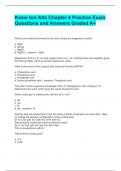
-
Knew ton Alta Chapter 4 Practice Exam Questions and Answers Graded A+
- Exam (elaborations) • 12 pages • 2024
-
Available in package deal
-
- $17.99
- + learn more
Knew ton Alta Chapter 4 Practice Exam Questions and Answers Graded A+ What is the chemical formula for the ionic compound magnesium oxide? a. MgO b. MnO2 c. Mg2O d. Mg2O3 a. MgO Magnesium forms a 2+ ion and oxygen forms a 2− ion. Putting these ions together gives the formula MgO, which is named magnesium oxide. What is the name of the oxyacid with chemical formula H3PO4? a. Phosphorus acid b. Phosphoric acid c. Phosphate acid d. Hydrophosphoric acid b. Phosphoric acid ...
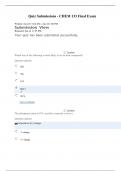
-
CHEM133 Week 16 Final Exam (Spring) Questions and Answers APU
- Exam (elaborations) • 19 pages • 2023
- Available in package deal
-
- $32.99
- + learn more
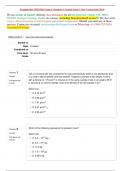
-
Straighterline CHEM101 General Chemistry I Graded Exam 1 (New Version June 2024)
- Exam (elaborations) • 13 pages • 2024
- Available in package deal
-
- $10.49
- + learn more
Question 1 Correct 5.00 points out of 5.00 Talc is a mineral with low conductivity for heat and electricity which is not attacked by acid. It is used in talcum powder and face powder. Suppose a sample of talc weighs 13.65 g with a density of 1.75 g/cm3 in mineral oil. If this same sample of talc in air weighs 35.97 g, assuming no volume change, what is the density of the talc sample in air? Select one: A. 2.44 g/cm3 B. 2.82 g/cm3 C. 1.61 g/cm3 D. 4.61 g/cm3 E. 2.63 g/cm3 Question 2...
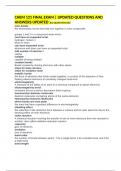
-
CHEM 121 FINAL EXAM | UPDATED QUESTIONS AND ANSWERS UPDATED .Buy Quality Materials!
- Exam (elaborations) • 5 pages • 2024
-
Available in package deal
-
- $8.99
- + learn more
CHEM 121 FINAL EXAM | UPDATED QUESTIONS AND ANSWERS UPDATED .Buy Quality Materials! ionic bonds the electrostatic forces that hold ions together in ionic compounds groups 1 and 2 in a compound mean ionicc cant have an expanded octet hydrogen, helium, li thium to neon can have expanded octet aluminum and down can have an expanded octet odd number of electron = radical isolable capable of being isolated covalent bonds Bonds created by sharing electrons with other atoms. steps for ...
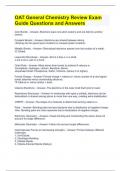
-
OAT General Chemistry Review Exam Guide Questions and Answers
- Exam (elaborations) • 5 pages • 2024
-
Available in package deal
-
- $10.49
- + learn more
Ionic Bonds: - Answer--Electrons leave one atom (cation) and are held by another (anion). Covalent Bonds: - Answer--Electrons are shared between atoms. -Sharing can be equal (pure covalent) or unequal (polar covalent). Metallic Bonds: - Answer--Delocalized electrons spread over the surface of a metal. -D Orbital. Lewis-Dot Structures: - Answer--Dot is a free e- in a shell. -Line is an e- pair in a bond. Octet Rule: - Answer--Most atoms form bonds to achieve 8 valence e-. -Excepti...

How did he do that? By selling his study resources on Stuvia. Try it yourself! Discover all about earning on Stuvia



